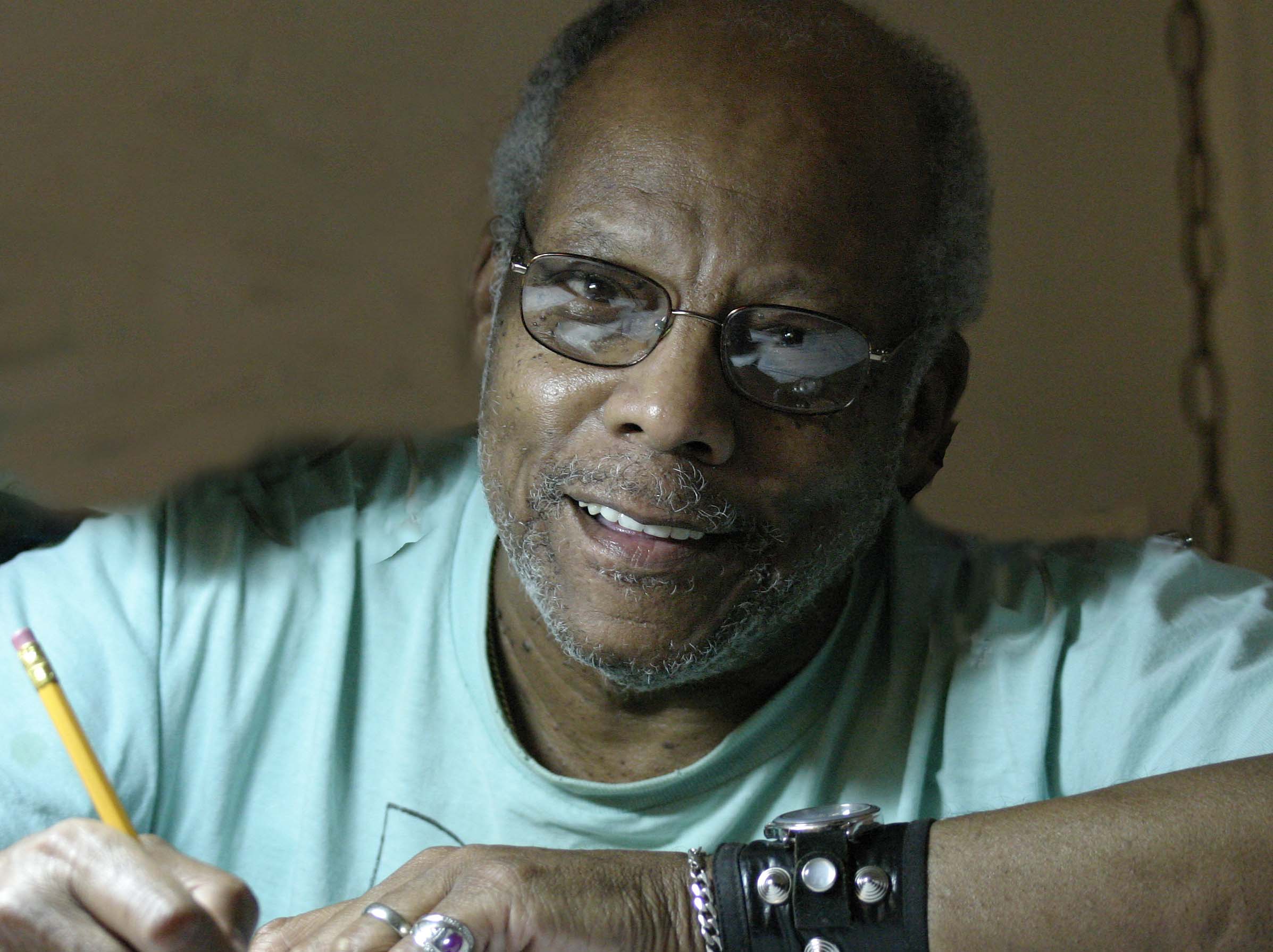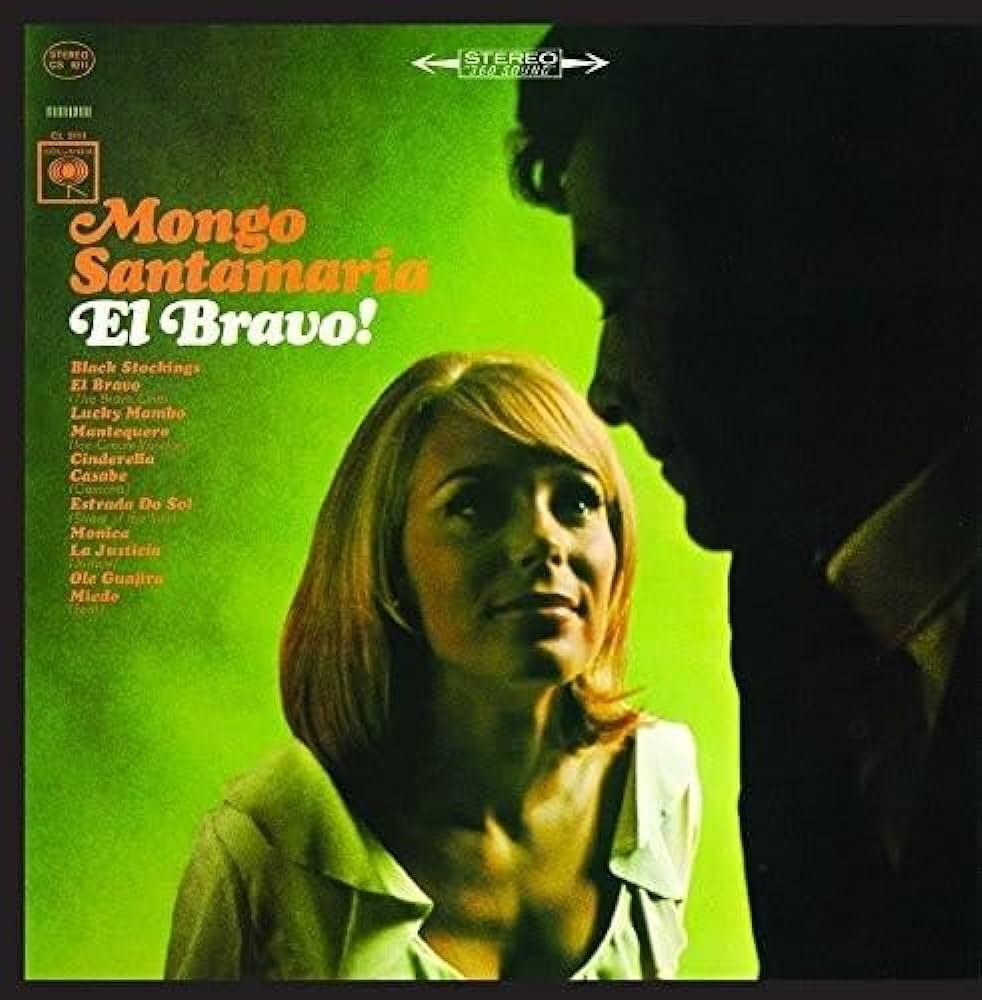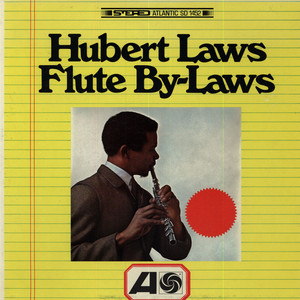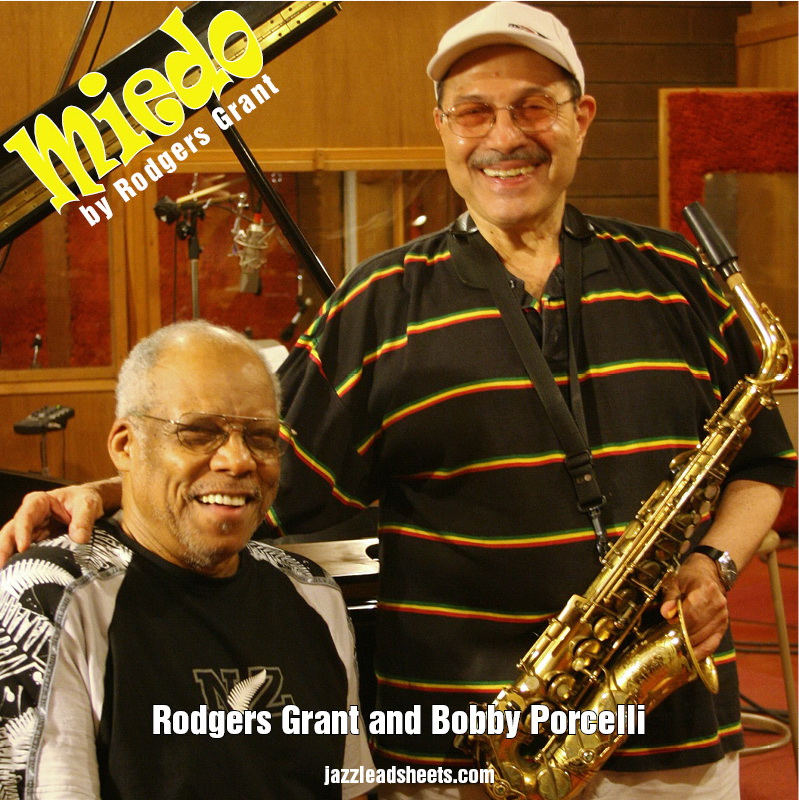Miedo – Rodgers Grant
A constantly evolving two-beat harmonic structure continues to enchant and bring new life to Rodgers' elegant but simple repeating two-measure melodic theme which starts each A section. Melodically, all A sections start the same, but each is transformed by a new harmonic path. Rodgers Grant originally wrote Miedo as an instrumental Bolero for the Mongo Santamaria ensemble. Ballad treatments have also been recorded by Hubert Laws, and by the Rodgers Grant/Bobby Porcelli duo.
- Recording: Mongo Santamaria - El Bravo
- Recorded on: October 16, 1964
- Label: Columbia (CL 2411)
- Concert Key: E-flat
- Vocal Range: , to
- Style: Ballad
- Trumpet - Marty Sheller
- Flute - Hubert Laws
- Saxes - Bobby Capers
- Piano - Rodgers Grant
- Bass - Victor Venegas
- Conga & bongo - Mongo Santamaria
- Timbale - Carmelo Garcia
- Vocals - Wito "El Watusi" Correa
- Vocals - Nacho Sanabria
Video
- Description
- Historical Notes
- Solos
- Piano Corner
- Bass Corner
- Drum Corner
- Guitar Corner
- Inside & Beyond
- Minus You
See the duo recording notes (Grant/Porcelli) for a harmonic analysis of this composition.
Our lead sheets are labeled "Ballad," which reflect the later recordings.
Most of you probably only know of Hubert as a flute player, but with Mongo he also played a lot of tenor sax. The Santamaria version was recorded during the time that pianist Rodgers Grant and Hubert Laws were playing with Mongo. Note also that composer/arranger/trumpeter Marty Sheller was on the session. These musicians stayed in touch and remained close friends.
Related Songs
Email Send Miedo to a friend
- Recording: Hubert Laws - Flute By-Laws
- Recorded on: September 13, 1965
- Label: Atlantic (LP 1452)
- Concert Key: E-flat
- Vocal Range: , to
- Style: Ballad
- Flute - Hubert Laws
- Trumpet - Jimmy Owens
- Trumpet - Martin Banks
- Trombone - Tom McIntosh
- Trombone - Garnett Brown
- Piano - Chick Corea
- Bass - Richard Davis
- Drums - Bobby Thomas
Video
- Description
- Historical Notes
- Solos
- Piano Corner
- Bass Corner
- Drum Corner
- Guitar Corner
- Inside & Beyond
- Minus You
See the duo recording notes (Grant/Porcelli) for a harmonic analysis of this composition.
Related Songs
Email Send Miedo to a friend
- Recording: Rodgers Grant - Miedo
- Recorded on: June 24, 2009
- Label: jazzleadsheets.com (JLS 1059)
- Concert Key: E-flat
- Vocal Range: , to
- Style: Ballad
- Alto Sax - Bobby Porcelli
- Piano - Rodgers Grant
Video
- Description
- Historical Notes
- Solos
- Piano Corner
- Bass Corner
- Drum Corner
- Guitar Corner
- Inside & Beyond
- Minus You
Take 1 is a two-chorus track (audio clip above). Bobby (on alto sax) plays the melody for the first two As and C with the Rodgers playing the bridge melody. Then Rodgers on piano solos two A sections, and Bobby comes in at the bridge and plays through the last C section. They change things up for the second take. Take 2 is a three-chorus track CLIP. This time, Bobby plays the melody through the bridge of the first chorus, and Rodgers plays the melody at letter C, taking the 1st ending which sets Bobby up to play two solo choruses. In the first chorus, Bobby embellishes the bridge and letter C melody, but I (Don Sickler) waved him on to play an additional chorus, so Bobby solos again for the A sections, embellishes the bridge melody and ends with the C melody into the 2nd ending with the tags.
Harmonic analysis:
Miedo has a very simple melody, but the harmony and structure are subtly intricate throughout. This song seems to be in C minor, but there are no phrases that end there; the ultimate key is E-flat major. This key center is reached by a lot of slick harmonic movement, combining smooth voice leading and strong root movement. All three "A" sections are different: the first repeats the same melodic phrase throughout while going from C minor to E-flat, the second moves instead to G major in the fifth measure, and the C section harmonically starts like A2 (first two measures) then switches harmonically to the 3rd and 4th measures of A1. The 6th measure of C introduces a different melody, which is also tagged for the final ending of the out melody. The bridge explores the home key in an entirely different way before briefly modulating to G-flat major.
Coming from the state of Washington, the city of Spokane, as I did, I was very lucky to make the acquaintance of, and become friends with, major musicians soon after I arrived in New York City. Working in the Catskill mountains, at the hotels there, I first became acquainted with pianist/composer Rodgers Grant. A fellow master at ping pong, which we played to musician-tournament level, Rodgers was a composer with an enviable command of harmonic progressions and voicings. Early in our acquaintance, I forced him to write down his voicings,"footballs" he called them. The voicings moved so beautifully, one to the next, they added amazing beauty and depth to every song he played. When we played anything together (standard or jazz), his voicings made every composition vital, personal and elegantly beautiful.
When I met him, Rodgers had been semi-retired from the jazz scene, working as a show pianist at hotels in the Catskills for several years, but he never lost his creative imagination. Bobby and Rodgers were friends from early days, both from the Bronx; they played with Mongo Santamaria and in other Latin bands. I became friends with both Bobby and Rodgers (and Hubert Laws, also from the Santamaria band, who came to our NYC loft to play ping pong); the friendship grew over the years. We spent many hours on ping pong and music in our rehearsal studio at 44th street, then on 28th street (the jazzleadsheets.com studio). In 2009 I brought the two friends to the master's recording studio, Rudy Van Gelder's, in Englewood Cliffs, to play together. The results are unmistakably electric.
Related Songs
Email Send Miedo to a friend

Rodgers Grant
January 18, 1936 – April 12, 2012
Rodgers Grant was an American jazz pianist, composer, and lyricist. After having worked with saxophonist Hugo Dickens in the 1950s, he became pianist for Mongo Santamaría in the 1960s. In 1963, Grant wrote the hit, Yeh! Yeh! in collaboration with Pat Patrick. Jazz vocalist Jon Hendricks added original lyrics and recorded the song with Lambert and Bavan at the Newport Jazz Festival of 1963. It became an international hit as recorded by Georgie Fame and the Blue Flames in 1965. Read more...



